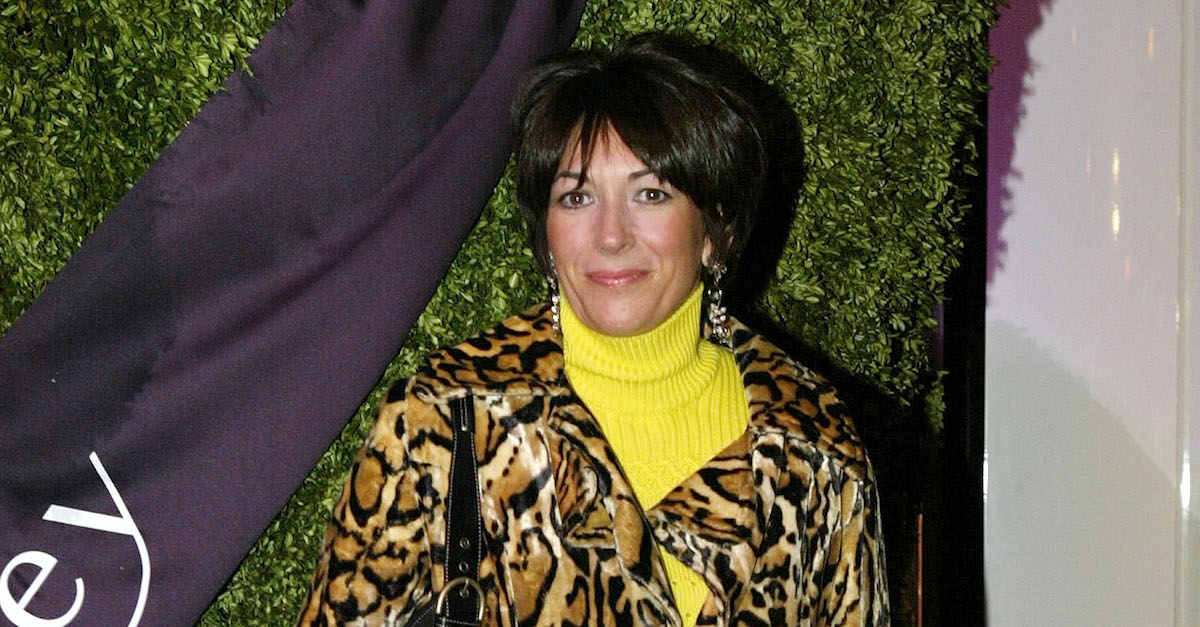
Jeffrey Epstein‘s former girlfriend and alleged groomer Ghislaine Maxwell wants a judge to stop federal prosecutors from using information obtained from a long-sought-after tranche of secret Epstein files. Maxwell also thinks the prosecutors should be punished for accessing those files in the first place.
In a Wednesday afternoon letter motion filed with U.S. District Court for the Southern District of New York (SDNY), Maxwell attorney Ty Gee asked U.S. District Judge Loretta Preska to “vindicate its Protective Order and punish its violation.”
According to that filing, two deposition transcripts previously marked “Confidential” were subject to the terms of that order.
“Both transcripts ended up in the hands of the government, which used them to bring an indictment against Ms. Maxwell, charging her with, among other things, perjury in her deposition testimony,” the motion notes. “This is a serious violation of the Protective Order, and merits the commencement of contempt proceedings.”
Recall that Maxwell is currently engaged in two public legal battles: (1) a protective order issued in 2015 by Judge Robert W. Sweet involving the Epstein files in a since-settled defamation case between Epstein survivor Virginia Roberts Giuffre and Maxwell; and (2) the criminal sex-trafficking case brought by federal prosecutors in late June.
The Giuffre v. Maxwell protective order is the major legal impediment that has prevented the release of those files which are suspected to embarrass those alleged to have participated in the Epstein sex trafficking ring. A years-long process for unsealing some of those documents recently came to a head, and the first releases are scheduled to occur on Thursday, July 30.
Included in that first slate of potentially bombshell documents is one of the depositions referenced by Maxwell’s attorney. Epstein’s former right-hand-woman gave two depositions which were subject to the terms of the protective order, however, and the government allegedly relied upon them both in crafting her criminal charges.
Per the motion, at length:
Quoting verbatim from Ms. Maxwell’s April 2016 deposition transcript, the indictment alleges Ms. Maxwell gave false testimony (a) when she testified “I don’t know what you’re talking about” in response to a question whether Mr. Epstein “ha[d] a scheme to recruit underage girls for sexual massages . . . [i]f you know”; and (b) when she testified, “I’m not aware of anybody that I interacted with [other than plaintiff] who was 17 at this point.” None of these questions and answers was used in the summary judgment papers or released by the Second Circuit. The transcript containing this testimony is sealed.
“Only two parties—plaintiff and Ms. Maxwell—and their counsel had proper access to the transcripts of Ms. Maxwell’s deposition,” the filing continues. “The transcripts, which were designated ‘Confidential,’ were the subject of the Protective Order strictly limiting the persons to whom the parties may disclose ‘Confidential’-designated documents.”
Since those depositions were allegedly accessed by the government in violation of the protective order, Gee argues, Judge Preska should force the SDNY’s criminal prosecutors to stop relying on the information contained in the deposition and suffer additional consequences as well.
“We respectfully submit that in the event the Court finds a violation of the Protective Order, this Court should direct the government to return to the Court any copies of the deposition transcripts and enter an order to show cause why the person(s) who violated the Order should not be held in contempt,” Maxwell’s attorney asked the court.
In other words, Maxwell wants the judge in the ongoing civil case involving the release of the Epstein files to stop the government from using some of those files in the criminal prosecution against her — and she wants to maintain the secrecy regime even longer due to the alleged prosecutorial misconduct. But does she stand a chance here?
Miami Herald journalist Julie K. Brown—whose pioneering work is the indirect cause of the entire legal system’s interest in Epstein and Maxwell–posed a relevant question on Twitter. She asked: “Does a protective order stand when the info you’re trying to hide (protect) is part of a crime?”
The consensus is that Maxwell doesn’t stand a chance.
“No judge will uphold a civil litigation protective order against a criminal inquiry,” replied attorney George Conway.
A court is unlikely to prize a civil protective order over the government’s asserted needs (and possible/potential subpoenas) in a criminal case. Civil orders are not allowed to be used as an end-run to conceal criminal activity–even if that activity is merely alleged at this point in time.
In other words, the courts won’t allow their own processes to be used to cover up a crime; the courts will not be seen with unclean hands.
The following back-and-forth illustrates this principle:
No. Confidentiality of an agreement which violates the law cannot be upheld. See NCIVM Corp v. O’Hara 241 F.R.D. 109 (2007) see also In re Richard Roe, 168 F.3d 69, 71 (2d Cir.1999) (the document was intended in some way to facilitate or to conceal the criminal activity);
— Andrew C Laufer, Esq (@lauferlaw) July 29, 2020
Read Maxwell’s full letter motion below:
Maxwell 7-29-20 Letter.pdf by Law&Crime on Scribd
[image via Mark Mainz/Getty Images]